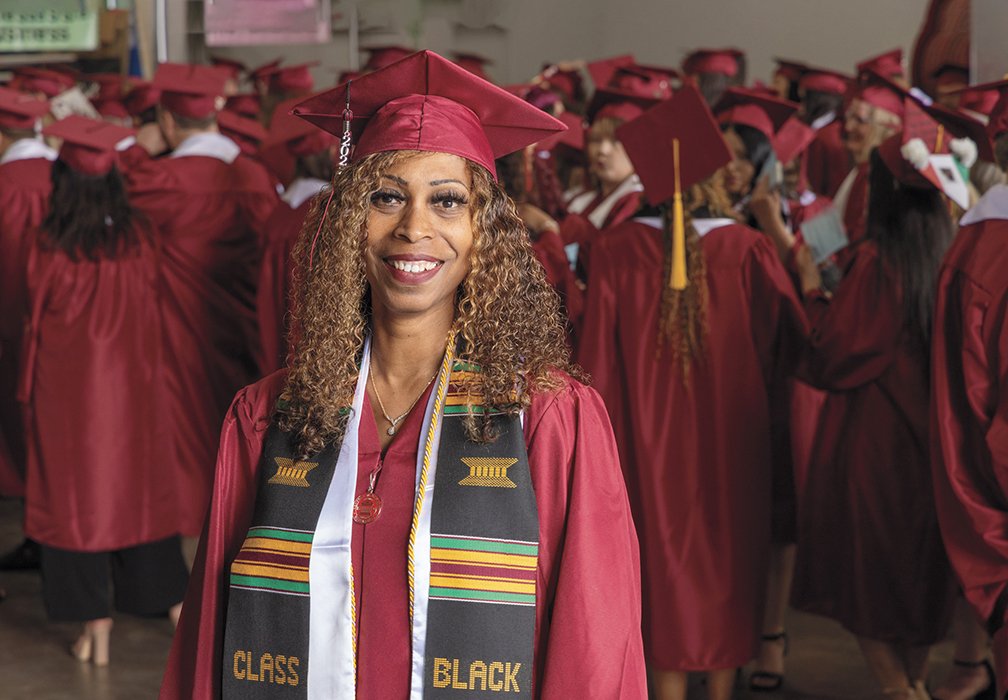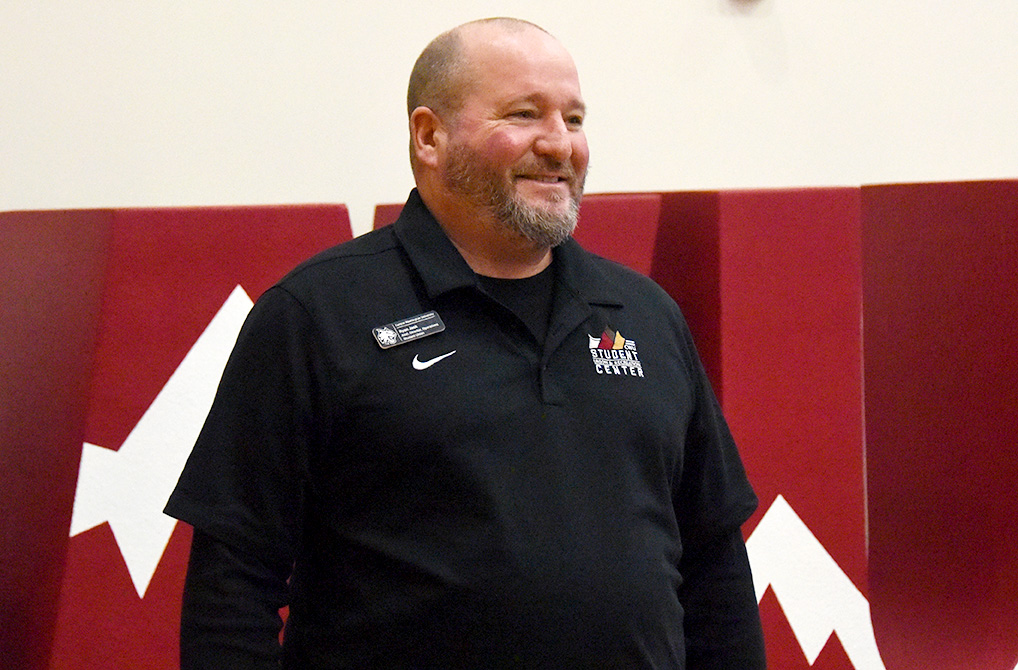Investment in Opportunity: CWU degrees have served College of Business alumni well
- July 20, 2023
- Tara Roberts

Editor's note: This story appears in the latest edition of Voyage Magazine
During Kevin Moran's senior year studying marketing management at CWU he became the first-ever College of Business ambassador. Moran represented the college at events, welcomed visitors, and reached out to new students.
It wasn't his first time being an ambassador. The moment he decided to go to college, he became a representative for higher education in his community.
Moran ('15), who is from Kennewick, was the first in his family to go directly to a four-year college. When he called home during his first year at Central, his family peppered him with questions about his experience. When he visited, neighborhood kids asked what he was learning, what he liked about college, and whether he met other Spanish-speaking students.
Today, Moran is back in Kennewick, working as a community development officer for STCU, a Spokane-based credit union with branches in the Tri-Cities. He continues to be an ambassador for higher education; he's raised over $200,000 for scholarships through the Hispanic Academic Achievers Program, which he's volunteered for since his senior year at Central.
He wants to ensure students with backgrounds like his have the opportunity to change their lives by earning a degree.
"I really appreciate the fact that higher education allowed for me to have a better understanding of having a goal, accomplishing it, and also recognizing the value in it, because it can be incredibly impactful to others, as long as you're willing to put that effort in," Moran said. "It just made me who I am."
Higher education needs ambassadors like Moran more than ever. College-going rates across the nation have dropped rapidly since the pandemic upended the world from 2020-22.
According to a September 2022 Newsweek article, "enrollment is down nearly 10% over the past two years, a loss of 1.4 million students pursuing degrees." The article cites a survey by the nonprofit ECMC Group that found the percentage of teens considering a four-year degree plummeted from 71% in May 2020 to 51% in 2022.
Washington has followed the same pattern. A March 2023 analysis from the Washington Student Achievement Council reports only 51% of the state's classes of 2020 and 2021 enrolled in a two- or four-year institution within a year of high school graduation-a 9% drop from 2019. The decline was sharpest among Hispanic and Latino students, with a 14% drop from 2019 to 2021.
The concern with these drops isn't about filling classrooms. It's about the future-for individuals, their families, and their communities.
Investing for a Lifetime
For individuals, one of the biggest selling points for earning a degree is simple: college pays off. The median income for full-time workers with bachelor's degrees between the ages of 22 and 27 in 2021 was $52,000, according to a Newsweek analysis. For the same age group with high school diplomas only, the median income was $30,000. Research also shows people with bachelor's degrees hold a higher percentage of well-paying jobs, are less likely to become unemployed, and have higher lifetime earnings.
Jeffrey Stinson, the recently departed dean of the College of Business, said he expects the earnings gap to close in some disciplines. But the overall difference is still dramatic.
"A degree is still a very strong investment, and one of the best investments that you can make," Stinson said. "There's a lot of talk in the public press about removing a degree as a requirement for many jobs. And yet, if you look at who's getting hired for those jobs, there still is an observable preference for a degree, and certainly when you get into promotion and advancement opportunities. You still have many more opportunities with a degree than without."
The personal benefits go beyond money. College creates an environment where students build relationships with peers and mentors.
Evelyn Ramos ('22)-a first-generation student from Cowiche, Washington, who majored in business with a specialization in financial planning-found close friends at Central. Her professors also were an invaluable resource.
"The professors really do care for you and want you to be successful," Ramos said. "They provide you with all the resources necessary to find a job and go out into the world."
For some, the promise of future earnings is tempered by the cost of college now. To save money, Ramos earned her associate's degree at a community college. After transferring, she found a multitude of scholarship opportunities at Central.
Central's alumni network not only helped make college more affordable for Ramos; it connected her with her career. She received the Haberling Family Scholarship, and a scholarship director introduced her to the sponsors, Ty ('83) and Noelia Haberling of Kennewick. Ty Haberling later encouraged Ramos to apply for a position at his company, HFG Trust.
"I thought, 'You know what? I will,'" Ramos said. "'This school and this program have prepared me for this, and I'm ready to make the jump.'"
Ramos secured her job as a wealth planner at HFG a few months before graduation.
Skills Beyond the Classroom
Ty Haberling said a college degree-especially from Central's personal financial planning program-provides the background people need in the growing financial planning industry. He doesn't believe a four-year degree is a must for everybody, but for professional fields, college is an opportunity to prepare for a career and mature.
"What does college give you? You're going to figure out whether you've got the discipline and the focus to be able to stay on campus and to complete your coursework and balance life," Haberling said. "There's so many things that distract you when you're on your own at 18."
Brandy Peters-Mayer-a senior program manager at Microsoft who is part of the College of Business Leadership Board-said her father always told her a degree shows people you're trainable.
"A bachelor's degree is the gateway into proving that you can follow through and commit to something and get those critical, essential skills in your field," she said. "Then the reality is, you use those skills that you got from your undergraduate to apply to wherever you go."
Higher education also gives people the opportunity to become more well-rounded and globally minded, Peters-Mayer said.
"The thing I like about Central is how diverse the university is," she said. "The experiences you get with such a diverse student population really prepare you for the working world."

2022 CWU graduate Ronee Jones now works for Shannon and Associates as an associate accountant, and she continues to work at the firm while earning her master's at Central.
Inspiring the Next Generation
Like Moran, Ramos set an example of college success for her family and people in her small, agriculture-focused hometown of Cowiche. Ramos hopes her experience shows young people that their strengths and interests can guide them in deciding their college path.
"Take in mind your strengths and passions when you're figuring out what major to pursue," Ramos advised future students. "You will be dedicating a lot of your time learning about this subject, so choose a major you will find enjoyable and engaging. Think about what you want and need in your career and explore your options."
Ronee Jones ('22) also wants her family to follow in her educational footsteps. Jones worked in operations at a telecom company for 20 years. When her position was cut, the company offered her retraining funds.
"I'd been trying to get a degree for years, but me having kids, it was kind of to the back burner-I'd take a class every so often to try to get there," Jones said. "This kind of kick-started me. Like, 'OK, well, you've got nothing else to do,' since my kids were grown."
Jones fell in love with accounting at Renton Technical College and transferred to Central to earn her bachelor's.
With the encouragement of P.R. O'Shaughnessy Executive Professor of Accounting Jenny Cravens, she met employers through Central's Accounting Career Event. Shannon and Associates hired Jones as a part-time associate accountant, and she continues to work at the firm while earning her master's at Central.
Her next step is a doctorate-and encouraging her five grandchildren to earn at least master's degrees. And she hopes her story reaches even further.
"I want to be an example for people-especially, honestly, Black and Brown people," Jones said. "You don't see a lot of us in accounting. There was nobody that was my nationality in any of my classes, as a professor, none. That can be disheartening. People may think, 'Can I really do it? I don't see anybody. I don't see any examples.' So, I want to be one of those. I'm like, 'Yeah, you can do it, because I've done it.'"
Adapting for the Future
Higher education has a responsibility to adapt in response to students' and employers' changing needs, Stinson said. Part of this is making the four-year degree more flexible. For example, many universities are creating short-term certificates and stackable degrees-like the College of Business's new agribusiness minor/certificate programs.
Higher education curricula should change in line with the world, Stinson said. A degree can prepare people to change, too.
"We have to make sure students are getting technical competency, but we also need to make sure that we're teaching them to learn how to learn, and that they're going to have to be lifelong learners, that the skill that we just taught them has probably got a shelf life on it, with the advances in technology and the advances in industry," Stinson said. "They've got to be able to upskill and transition throughout their life. We can give them the skill sets and the confidence to do that."
CWU News

Ryan Jack appreciates opportunities for reflection and growth
February 16, 2026 by Staci Sleigh-Layman

CWU alumna’s singing group wins third Grammy Award
February 9, 2026 by David Leder